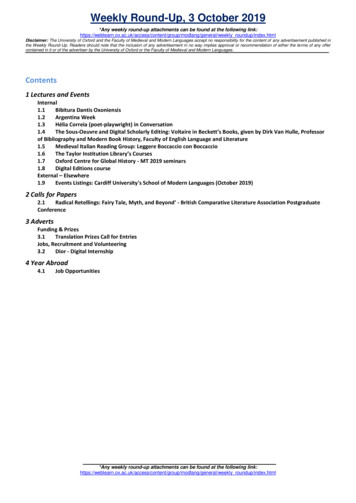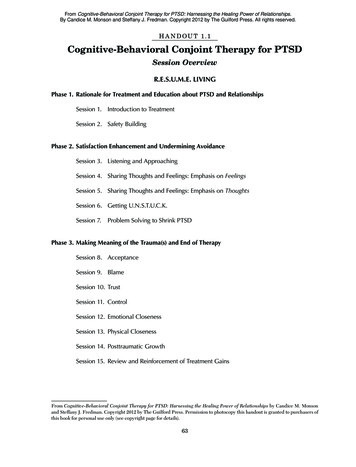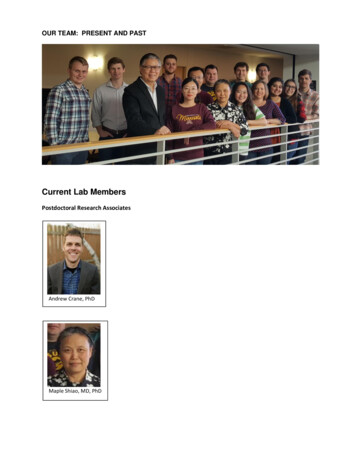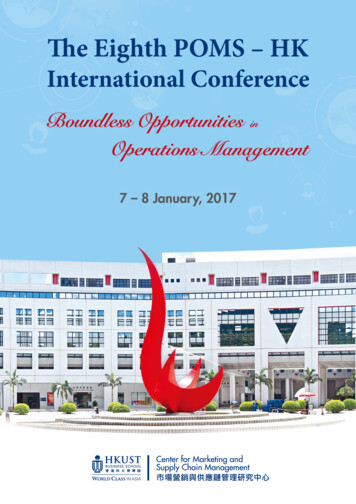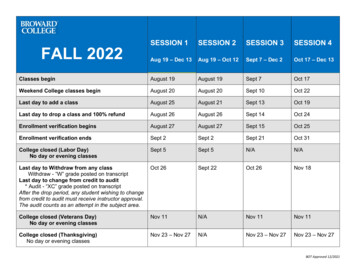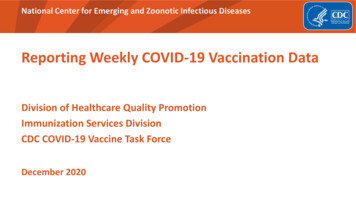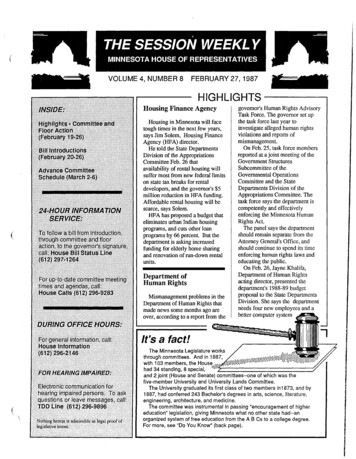
Transcription
0THE SESSION WEEKLY(MINNESOTA HOUSE OF REPRESENTATIVESVOLUME 4, NUMBER 8FEBRUARY 27, 1987HIGHLIGHTS-------Housing Finance Agency(Housing in Minnesota will facetough times in the next few years,says Jim Solem, Housing FinanceAgency (HFA) director.He told the State DepartmentsDivision of the AppropriationsCommittee Feb. 26 thatavailability of rental housing willsuffer most from new federal limitson state tax breaks for rentaldevelopers, and the governor's 5million reduction in HFA funding.Affordable rental housing will bescarce, says Solem.HFA has proposed a budget thateliminates urban Indian housingprograms, and cuts other loanprograms RY 66 percent. But thedepartment is asking increasedfunding for elderly home sharingand renovation of run-down rentalunits.Department ofHuman RightsMismanagement problems in theDepartment of Human Rights thatmade news some months ago are ·over, according to a report from thegovernor's Human Rights AdvisoryTask Force. The governor set upthe task force last year toinvestigate alleged human rightsviolations and reports ofmismanagement.On Feb. 25, task force membersreported at a joint meeting of theGovernment StructuresSubcommittee of theGovernmental OperationsCommittee and the StateDepartments Division of theAppropriations Committee. Thetask force says the department iscompetently and effectivelyenforcing the Minnesota HumanRights Act.The panel says the departmentshould remain separate from theAttorney General's Office, andshould continue to spend its timeenforcing human rights laws andeducating the public.On Feb. 26, Jayne Khalifa,Department of Human Rightsacting director, presented thedepartment's 1988-89 budgetproposal to the State DepartmentsDivision. She says the departmentneeds four new employees and abetter computer system Jfll!l!IJ m.-; :"-:· . .·"h.: .It's a fact!The Minnesota Legislature worksthrough committees. And in 1887,.:., .,.,.,.,.,,.,.,.,.,.,.,.,.,,., .,.,,-:.::::::::::·::·:·::·:·:·:'!with 103 members the House . . :;.:.:;. ;. . ;. ; :,:;:;:: · · · ····" · · had 34 standing, 8 special, :::':': :',.·· ··· ·· ·· ,,1(and 2 joint (House and Senate) committees--one of which was thefive-member University and University Lands Committee.The University graduated its first class of two members in1873, and by1887, had conferred 243 Bachelor's degrees in arts, science, literature,engineering, architecture, and medicine.The committee was instrumental in passing "encouragement of highereducation" legislation, giving Minnesota what no other state had--anorganized system of free education from the A B Cs to a college degree.For more, see "Do You Know" (back page).
2to aid in "administering and enforcingthe Minnesota Human Rights Actthat prohibits discrimination inhousing, employment, publicaccommodations, public services,education, and credit on the basis ofage, race, color, creed, religion,national origin, sex, marital status,public assistance status, and familialstatus." She says 80 percent of thedepartment's cases involve allegeddiscrimination in employment.Winona StateWinona State University could geta new one-of-a-kind engineeringprogram under HFl 14 (PelowskiDFL, Winona), a bill the HigherEducation Committee recommendedto pass Feb. 25. It would establish acomposite science and engineeringprogram for undergraduate students.Rep. Gene Pelowski says Winonais the best location for the programthat would compliment localindustries currently using resin-fibercomposites. Products containing thematerials range from airplanes andcanoes to the J arvik-7 artificial heart.If the bill passes, Winona Statewould be the only U.S. institutioneducating undergraduate students forcareers in the rapidly growingcomposite industry.Mail-in ballotsMinnesota. voters could soon findcounty or municipal election ballotsin their mail" boxes.General Legislation, VeteransAffairs and Gaming Committeemembers gave unanimous approvalFeb. 26 to HF281 (Steensma, DFLLuverne) authorizing experimentalmail elections.The bill would give county andmunicipal governments a low-costoption that could increase voterturnout on special-issue elections,according to Rep. Andy Steensma.Officials could issue mail-in ballotsonly for special elections localgovernments hold on days other thanthe general election day and don'tinclude candidates for office.The bill would require a two-yeartest and review period for the mail-inballots.State universitiesSt. Cloud State President BrendanMcDonald says recent enrollmentgrowth at Minnesota institutions is agood sign."It suggests that more ofMinnesota's young people areinvesting in themselves and inMinnesota's future," McDonald toldmembers of the Education Divisionof the Appropriations Committee.More than 3,100 new studentsenrolled in the seven stateuniversities since 1985. Althoughthat's good news, system presidentssay it hurts the growing schools thatcome under the state's average costfunding, a system that bases stateappropriations on enrollment figuresfrom two years before.System Chancellor Dr. RobertCarothers told legislators that thisfunding system works well forshrinking enrollment, but leavesgrowing schools with unfundedstudents for two years. He sayssystems aren't ready to absorb coststhat come with large enrollmentincreases."We're forced to reallocateresources within the system torespond to those needs" he says."What that frequently means is thatwe fund those sections of newstudents by not buying books for thelibrary, not buying equipment, andnot doing other things that we needto do to maintain the quality of theinstitution."Carothers says that funding lag is aconsistent problem. He toldlegislators the state could meetstudent needs better if the systemmore closely tied funding forenrollment increases to currentenrollment levels.The committee looked at StateUniversity System budget requestsFeb. 24.Home health careIi censurePeople who provide home healthcare in the state may need a license tocontinue that service, under a bill theHealth and Human Services' SocialServices Subcommittee approvedFeb. 24.HF120 (Greenfield, DFL-Mpls),according to its author, would protectthe elderly from abuse and ensurequality home health care for thosewho need it.Supporters voiced concern overadult abuse cases in the home healthcare field. They say the bill wouldprotect elderly and vulnerable adultsfrom abusive care providers who areunqualified for their jobs.· Spokespersons from Minnesota'sSenior Federation (MSF) say thestate's elderly population ismushrooming, and abuse cases areincreasing. They say adoption ofmandatory licensing would be a"giant step forward" in protecting therights of those who need hbme-healthcare.Karina Allen of MSF toldcommittee members that ruralMinnesotans--especially the elderly-need the same quality home healthcare as the rest of the state. Shesays, "I resent the idea that ruralpeople should not demand standardsas high as people in urban areas.They should not be forced to acceptan untrained person for a positionthat requires expertise."Under the bill, hospice careproviders would also need licenses tocontinue their service to terminallyill patients in a home setting.Child support withholdingA bill proposing immediateincome withholding moved a stepfurther in the legislative process Feb.24 when the Judiciary Committeerecommended it to pass.The committee amended HF163(Schoenfeld, DFL-Waseca) to givecounties the option to begin courtordered withholding for all child
3(support or maintenance orders courtsinitiate or modify after Aug. 1, 1987.Supporters say requiring immediatewithholding would make it morelikely that children would receivesupport in a timely and regularmanner. Opponents say it presumesthe parent is irresponsible and won'tpay.The committee amended another ofthe bill's provisions to allow thecourt to divide the responsibility fora child's non-insured medical anddental expenses between parentsaccording to each parent's ability topay.The bill goes next to the Healthand Human Services Committee.Credit card surcharges((A bill that would ban credit cardsurcharges moved out of theCommerce Committee Feb. 24.Minnesota retailers who charge anextra fee to credit card users could goto jail for up to 90 days and/or pay a 700 fine under HF240.The bill, which Rep. John Sama(DFL-Mpls) sponsors, has AFL-CIOsupport. Tobey Lapakko,spokesperson for the organization,says 10 other states have similarlegislation on their books and it'stime for Minnesota to join withthem.Rep. Tony Bennett (IR-Shoreview)and Rep. K.J. McDonald (IRWatertown) oppose the bill. "Weneed to look a little deeper into this.It's another restriction on our localmerchants on our local streets thatmay help another major corporationsuch as American Express that doestheir business outside . Minnesota,"Bennett says.HF240 would not take awayretailers rights to offer discounts forcash and the bill doesn't cover Masteror Visa cards or any credit cards thatoriginate in other states, according toLapakko.Mystery CaveWith a little help from the state,Rep. Elton Redalen hopes to givepeople a chance to explore MysteryCave, near Spring Valley insoutheastern Minnesota.HF398 (Redalen, IR-Fountain)proposes that the Department ofNatural Resources buy Mystery Caveto safeguard the cave's natural andeducational value. The cave's presentowner closed it and moved out ofMinnesota.Redalen told the Environment andNatural Resources Committee Feb.24, that southeastern Minnesotaneeds some attraction to bring peopleinto an area that can no longersupport itself on agriculture alone.Adding Mystery Cave to ForestvilleState Park could make the park asattractive to tourists as many otherMinnesota state parks, he says.The committee approved the billand sent it on to the full House.Farm Advocate ProgramWhen Lou Ann Kling helped aneighboring farmer restructure an olddebt with the Farmers HomeAdminstration five years ago, shenever thought her efforts would leadto the Minnesota Farm AdvocateProgram.Kling, a southwestern Minnesotafarmer, is one of 25 farm advocatesin the state. Her one-on-one sessionswith farmers gave birth to theDepartment of Agriculture's FarmAdvocate Program in1984.Under the program, the departmentcontracts with trained advocates,generally farmers themselves, to helpother farmers facing foreclosure.Advocates get 5 to 6 an hour for20 hours a week, but Kling says theyactually work around the clock to getfarmers ready for mediation. "Thecalls may start at 5:30 a.m. andcontinue past midnight," she says.An.ne Kanten, assistantcommissioner of agriculture, says theadvocate program has helpedapproximately 10,230 farmers todate. She says the current client loadfor advocates is 803 farmers, eachcarrying an average of 36 active files.She says a department survey showsthat 30 percent of the state's farmerscould use the program in upcomingyears.The department, Kanten added, hassubmitted a change-level request toraise advocates' salaries to 8 an hourand transfer the program to the AVTIsystem.Kling and Kanten reported to theAgriculture Committee Feb. 23.Labor-management billsThe Labor-Management RelationsCommittee Feb. 23 recommendedpassage of HF52 (Ogren, DFLAitkin), a bill that would require skiresorts to pay overtime wages toseasonal workers who work morethan 48 hours in a week. Opponentsof the bill argue that ski resortworkers shouldn't get overtime paybecause they don't work year-round.Under the proposal, the law that letsstate fair workers earn overtime paywould also cover ski resort workers.The committee also recommendedfor passage a measure that wouldgive privately contracted food serviceworkers at some state universities theoption to get state employee life andhealth insurance. According to BobJohnson (DFL-Bemidji), author ofHFl 19, the workers had stateemployee insurance coverage untilthe state reclassified them asprivately contracted workers in 1977.To compensate for reclassification,Johnson says the workers shouldhave an option to buy the employeeinsurance. Opponents say the stateshould not allow private employeesto contract with the state forinsurance.The committee also supportedHF134 (Price, DFL-Woodbury), abill that would require employers tonotify employees and job applicantsif they file for bankruptcy or ifsomeone files petition for
4involuntary bankruptcy against them.On a voice vote, the committeeunanimously recommended the billto pass.Unemployment insuranceHow do you file forunemployment insurance?Terrence Clark, Department ofJobs and Training, explained theprocess to the UnemploymentInsurance and Workers'Compensation Division of the LaborManagement Relations CommitteeFeb. 23.To be eligible for benefits, saysClark, workers must be unemployedthrough no fault of their own, andhave earned at least 108.00 a weekfor 15 work weeks prior to theirunemployment. · Eligibleunemployed people receiveunemployment benefit payments tostabilize their income and free themto look for work on a full-timebasis," he says.Minnesota offers the highestbenefits of any state for unemployedworkers. An average weekly paymentis 158.77, Clark says. Employersmaintain Minnesota's unemploymentinsurance fund through payroll taxes.Chair Rep. Mary Murphy (DFL,Hermantown) says the division willlook at ways to lower unemploymentinsurance costs and reduce thenumber of workers who get benefitsthey don't deserve. Clark says mostfraudulent cases involve an employerwho pays cash wages to a workerreceiving unemployment benefits,and neither the employer nor theworker report the wages on taxforms.Clark says that last year,unemployment insurance fraudinvestigators uncovered a total of2,248 fraudulent claims amountingto over a million dollars. Thedepartment recovered nearly 750,000of that amount.New gas pipelineSome natural gas consumers maysave money on their gas bills if thestate gets a proposed new pipeline.The Regulated IndustriesCommittee approved a bill Feb. 23that would give Minnesota's PublicUtilities Commission the right toapprove plans for a new gas pipelinebetween Cambridge and CoonRapids. Supporters of HF420(Jacobs, DFL-Coon Rapids) say itwould provide metro-area consumerswith cheaper Canadian natural gas.Under the bill, Rep. Joel Jacobssays, the Minnesota Public UtilitiesCommission would have regulatingauthority for the proposed pipeline.Supporters say the pipeline is strictlyan intrastate venture, and it could getunderway faster if the state ratherthan the Federal Energy RegulatoryCommission (FERC) approved theproject. They say FERC would takeover the project if the state didn't takeaction.Gary Peterson, a Minnesgascospokesperson, told lawmakers thatthe cheaper gas would save theircustomers between 4 and 8million.Adopted child's deathThe Department of HumanServices has a little-known rule thatrequires adoption agencies to notifybirth parents of their child's death.Rep. Kathleen Vellenga wants tomake this rule a law, and add a littleflexibility in the process.Adoption agencies would have tolet birth parents know when anadopted child dies, if birth parents askfor that notification. On the otherhand, birth parents could designatesomeone to notify the adoptionagency if they should die.Cheryl Hall, representing LiberalEducation for Adoptive Families inMinnesota (LEAF), testified in favorof HF270 (Vellenga, DFL-St. Paul),which would put the Department ofHuman Services rule into law.Hall says,"It would be less thanhumane to put people in thesituation . where you spend a greatnumber of years believing that you'llbe reunited with the child you placefor adoption. Or, as an adoptee, youspend that time believing that you'llbe reunited with.a parent from(whom) you're separated, only to findout that parent has been deada . number of years. And that isknown to an agency but not to you."Hall spoke at a Feb. 23 Crime andFamily Law Division hearing wheremembers approved the proposal. Itnow goes to the full JudiciaryCommittee.Cigarette taxIf the cigarette tax goes up, somecollege and vocational students couldbe thanking smokers for betterclassrooms and libraries.On Feb. 23, members of theEducation Division of theAppropriations Committee looked atthe governor's plan to fund capitalimprovements on state campuseswith money from an increase in thestate cigarette tax.The plan would boost the tax sixcents a pack. That could raise 7 5percent of the funds the governor hasasked for to expand facilities onseveral campuses.A large part of the estimated 48million in cigarette tax receiptswould pay for expansion of libraryfacilities at Mankato, St. Cloud, andBemidji State universities. Fundswould also go to establish child careservices at AVTis and communitycolleges.But some lawmakers worry aboutthe plan. They say the state isbanking on money it may nevercollect because the Legislature hasn'tapproved the tax increase.
5((('Biotechnology futureState budget forecastingOn the threshold of abiotechnology revolution, Minnesotaneeds to embrace developingtechnology to position itself as aworld leader, according to authoritiesin the field.Experts from the MinnesotaCouncil on Biotechnology andmembers of the state's educationcommunity spoke in support ofbiotechnology at a Future andTechnology BiotechnologySubcommittee meeting Feb. 23.They say Minnesota is in a goodposition to make biotechnology afuture core industry.A. Richard Baldwin, chairperson ofthe Minnesota Council onBiotechnology, compared theindustry to the computer industry inthe late 1930s and early 1940s. Hesays that even though research in thefield is new, biotechnology couldimpact society more than computersdid.Members of the educationcommunity advise a greater emphasison education now. They say whenschool age children reach adulthood,they. will need skills and tools tocarry the "biological revolution" intoits next phase. Educators say we arenow in a pioneering phase, and thattechnology is moving faster thananyone expected three or four yearsago.Dr. Stephen Weber, vice presidentfor academic affairs, St. Cloud StateUniversity, agrees. He says the statemust provide more educationopportunities to keep pace."The revolution is moving soquickly that if we're not careful, itwill outstrip the educationalinfrastructure which is committed toperpetuating this revolution and toassisting it with the next generationof students," says Weber.·Estimates from experts say thebiotechnology industry will create52,000 jobs by the year 2000.Estimating state revenues is atough job, and it's getting tougher,says Jay Kiedrowski, commissionerof finance.At a meeting of the TaxesCommittee, Feb. 20, Kiedrowskisaid constantly changing tax lawscause the most problems for budgetforecasting. And this year, he sayshe can't imagine a more difficult timeto try to estimate state revenuesbecause of changes in the state's taxsystem. Tax law changes, accordingto Kiedrowski, account for 20 percentof forecast errors.Kiedrowski says the state'sbiennial budget approach is generallya good forecasting structure. But, hesays, some pieces of it need anannual review because factors likeinflation, property tax relief, andschool spending vary from year toyear.Rental housingChanges in federal tax laws willcreate a shortage of low- andmoderate-income housing andincrease the number of homeless inMinnesota, says Jerrold Boardman,director of the Bloomington Housingand Redevelopment Authority. Hespoke before the Housing andCommunity DevelopmentSubcommittee of the EconomicDevelopment and HousingCommittee Feb. 19."The budget for Housing andUrban Development has been cutdramatically since 1980. And withtax· changes, it will also becomemore difficult for the private sector toprovide decent, safe, and affordablehousing," says Boardman.He says private developers need atleast 750 per month for a twobedroom unit in the metropolitanarea. In the past, developers couldcharge 500 a month because taxshelters protected them from losses.Renters assistance programs reducedrent further so that one could pay 176 a month for a 750 a monthunit. Essentially, the federalgovernment was paying over 60percent of the rent for some lowincome renters.Cutbacks in federal funds meanmany renters won't be able to affordhousing, says B·oardman.notes:.Rural DevelopmentSubcommittee of the EconomicDevelopment and HousingCommittee continued review of HF2(Schoenfeld, DFL-Waseca) Feb. 24.The bill would restructure theDepartment of Energy and EconomicDevelopment and establish theGreater Minnesota Corporation. Thesubcommittee is also holding publicforums to get citizen views on ruraldevelopment programs at: ThiefRiv r Falls, City Auditorium, Feb.27, 10-11:30 a.m.; Willmar,Kandiyohi Entertainment Center,Feb. 27, 2:30-4 p.m.; Morris,Sunwood Inn, Feb. 28, 9:30-11a.m.; Jackson, A VTI, Feb. 28, 23:30 p.m.Museum programs would goout to greater Minnesota undera school services program the St.Paul Science Museum hopes to have.The Science Museum wants a 130,000 budget increase in 1988-89"for a new school services programthat will not only bring Minnesotastudents from rural areas to themuseum, but will also bring themuseum's programs throughout thestate," says museum president Dr.James Peterson. The Agriculture,Transportation and Semi-StateDivision of the AppropriationsCommittee toured St. Paul ScienceMuseum and Omni Theater Feb. 24.
6Air traffic control towers,Metropolitan AirportCommission offices, andequipment and airplane maintenancegarages had a visit from MetropolitanAffairs Committee members. Thelegislators toured Wold-Chamberlain(Twin Cities) International AirportFeb. 20.Emergency phone service9-1-1 serves nearly 90 percent ofMinnesotans. And the Departmentof Administration is in the process ofhooking up the other 10 percent,Babak Armajani, deputycommissioner, told the StateDepartments Division of theAppropriations Committee at budgethearings Feb. 23-24. At samemeeting, Minnesota PublicTelevision Association and theAssociation of Minnesota PublicEducational Radio Stations presentedbudget requests including 1,200,000 increase in 1988-89 formatching grants and broadcastingequipment.Minnesota schools thatdropped the milk-in-schoolsprogram because of federal budgetcuts could again offer milk tostudents under HF153 (Krueger, DFLStaples), a bill the AgricultureCommittee recommended to passFeb. 24. It requires all schools toprovide one-half pint of milk a day tostudents in K-12 and appropriate 10million to the Department ofEducation to reimburse schools.HF153 goes next to the EducationCommittee.St. Paul homeowners whosell homes dating back before1973, may have to install hard-wiresmoke detectors before putting theirhouses on the market. On Feb. 24,the Local and Urban AffairsCommittee recommended to passHF357 (Orenstein, DFL-St. Paul), abill that would let St. Paul's CityCouncil move ahead with plans torequire the detectors. Bill's authorsays state law currently requires hardwire smoke detectors in homespeople built since1973. He says thecouncil wants to go a step furtherbecause about 53,000 St. Paulhomes went up before1973.Minnesota could get over 5million in revenue if it capturesfive percent of the more than 100billion national software industry,says Rosemary Fruehling, director ofthe Office of Software TechnologyDevelopment. She presented heroffice's plans to expand Minnesota'ssoftware industry at the Feb. 25meeting of the Future andTechnology Software Subcommittee.Fruehling says Minnesota now has2. 7 percent of the national market.About 13,000 Minnesotanswork in the state's softwareindustry, up from 2,500 10 yearsago. Between 1976 and 1984, thestate's software industry was the fifthlargest creator of jobs, according tostatistics from the Department ofEnergy and Economic Development.Legislators heard firsthandabout effects of AT&Tdivestiture on Northwestern Bell(NWB) when the Regulated IndustriesCommittee toured NWB's St. Paulplant this week.Local Liquor licensing,nonalcoholic advertising, rarewine auctions, and cased liquorpricing issues were on the agendawhen Regulated Industries BeverageSubcommittee met for the first timeFeb. 24.Proposals that affect taxes onaircraft, petroleum, deeds andmortgages, pulltabs, gross earnings,cigarettes, liquor, and lodging are inthe governor's miscellaneous tax bill,HF528 (Voss, DFL-Blaine). JohnHaynes, assistant revenuecommissioner, spoke for the bill atthe Taxes Committee Feb. 26.Members of the TaxesCommittee Tax LawsDivision heard a presentation onthe state's corporate tax structureFeb. 24, from John James, stateassistance commissioner,Compliance Tax Program.Minnesota counties opposemental health care fundconsolidation, says Dorothy Grotte,president of the Association ofMinnesota Counties. The proposalwould "straightjacket" counties anddictate what they can offer thementally ill, Grotte told the Healthand Human Services Division of theAppropriations Committee Feb. 25.The money lag in averagecost funding (ACF) is causingproblems, the Education Division ofAppropriations Committee heardFeb. 24. ACF dollars followstudents on the basis of two-year-oldenrollment figures, educators say.Some said they'd like moreimmediate funding for new students,but something of a safety net lagagainst possible enrollment decline.Deer hon ters may have a shotat keeping the two-deerhunting rule if a proposal theEnvironment and Natural ResourcesCommittee heard Feb. 26 becomeslaw. An experimental program incurrent law allows hunters in certainareas of the state to take two deer inthe1986 and '87 hunting seasons.The committee approved HF400 (D.Nelson, DFL-Champlin) whichwould make the program permanent.Hunters who want to take advantageof it would purchase an additionallicense at a cost of about 16.Current active members of thePublic Employees RetirementAssociation (PERA) wouldbecome immediately vested under a ·bill Rep. Wayne Simoneau (DFLFridley) presented to theGovernmental Operations CommitteeFeb. 26. HF463 would decreasefrom 10 to 5, the number of years anemployee must work to becomevested in PERA. The associationhas 25,000 active members, 16,000are women.
7(COMMITTEEACTION!) d d· F -- ZS . :;:::::,; UTIONS& INSURANCEAGRICULTURECompulsory education-changes1·::::1 9 :' :: : ·: :1:1:1:1:·:::.::.::1:1:··. : : l·: :.1· . ;: :1:.:.: ·: : 11HF432/SF425 (McEachem, DFL-St.Michael)--heard; amended. (SF in SenateEducation Committee)Electronic teller machinesg : : ," i g ;: 1 1: :;:1:1 1:;:;1 1: : 1·1:1·:1 ·1:1·i.ili·i:ili!l:i li!i!"i"!i!l!:l li i /1;::.?fEDUCATIONHF28/SF148 (Skoglund, DFL-Mpls)-recommended to pass as amended. (SF onSenate Floor)Milk-in-schools billHF153/SF221 (Krueger, DFL-Staples)-recommended to pass as amended;rereferred to Education Committee. (SFin Senate Agriculture Committee)COMMERCElil l M '. ti:·1 .:1: :l·l:l·1:1:;1J'i'J: ·1.:.1 : 1:1.1,1 1·1·1:1: : : :1.:1: 1 l:lil·: lCorporate takeover IawchangesHF27 /SF272 (Simoneau, DFL-Fridley)-recommended to pass. (SF in SenateSubcommittee on Civil Law)(Credit card surcharges-prohibitedHF240/SF49 (Sama, DFL-Mpls)-recommended to pass. (SF in SenateCommerce Committee)ECONOMICDEVELOPMENT &HOUSING1: 1·J.J' t : : :l :1 ;.: :1: 1:1 1·1:1:!l : 1: :1 1 1 .1:;:;1;1:1 .1: J:1:·1·1:;: .1:1,.:;,1: :jHastings--ind us trialdevelopment bondsHF129/SF135 (Ozment, IR-Rosemount)-heard. (SF in Senate EconomicDevelopment and Housing Committee)Anoka County--industrialdevelopment bondsHF381/SF356 (Simoneau, DFL-Fridley)heard. (SF in Senate EconomicDevelopment and Housing Committee)ENVIRONMENT &NATURALRESOURCESl·l::. :p . ::i f: : :·: :1:·1 :1: :.: 1:1:1 :.:1 11.:r: :Coop housing--insuranceratesHF 165/SF293 (Clark, DFL-Mpls)-heard. (SF in Senate CommerceCommittee)1:111 1:·:1: 11:: .1:11Spear fishing--restrictionsHF146 (Stanius, IR-White Bear Lake)-heard; laid over.Mystery Cave--authorizationto acquireHF398/SF405 (Redalen, IR-Fountain)-recommended to pass as amended;rereferred to Appropriations Committee.(SF in Senate Environment and NaturalResources)1: : Mr ; li! ·i!: ;:.:1: :1: 1: : : : 1 : : 1 : : : 1:1:1:1: 1: 1: :1 1:1:1: : 111 : 1 1Mosquito research--ecologicalimpactHF56 (D. Nelson, DFL-Champlin)-recommended to pass.Bow hunting--mechanicalrelease allowedHF102 (Stanius, IR-White Bear Lake)-recommended to pass; placed on ConsentCalendar.Elk breeding allowedHF340/SF284 (Schafer, IR-Gibbon)-recommended to pass; placed on ConsentCalendar. (SF in Senate Environmentand Natural Resources Committee)GENERALLEGISLATION,VETERANS AFFAIRS'&GAMING1::-.1 , * : t ·!i l· ·1:11.·:·,ill·!il;i:·.lil!··1:1 :.::1::1::·::11::·:::::11.·1::1:·::.1Mail-in elections--establishHF281/SF415 (Steensma, DFL-Luveme)-recommended to pass. (SF in SenateElections and Ethics Committee)Elections--candidate namesHF312/SF4,38 (Scheid, DFL-BrooklynPark)--recommended to pass. (SF inSenate Elections and Ethics Committee)Secretary of State-housekeepingHF334/SF416 (Orenstein, DFL-St. Paul)-recommended to pass as amended. (SF inSenate Elections and Ethics Committee)GOVERNMENTALOPERATIONS :; lJT.:; :.li.: :.'u.: .·:.r :!.s : .d : .: .:a.: .:; Y.: .J '.! iJ.F : : ;e : .:b.: .:. . . .-Deer hunting limitHF400/SF334 (D. Nelson, DFLChamplin)--recommended to pass. (SF inSenate Environment and NaturalResources Committee):.:.l.2.'. . '.: 6.:.: : : ; 1 :.· i·. ) . j:.:.:.: j-:. :;:::;:::::::::;::1,i. l,:lSt. Louis County--landtransferHF166/SF191 (Battaglia, DFL-TwoHarbors)--recommended to pass; placed onConsent Calendar. (SF in SenateEnvironment and Natural ResourcesCommittee)
.(,'8Cook County--land saleHF348/SF299 (Battaglia, DFL-TwoHarbors)--recommended to pass asamended; placed on Consent Calendar.(SF in Senate Environment and NaturalResources Committee)Retirement--lower vestingstandardsHF463 (Simoneau, DFL-Fridley)--heard.Faribault--state easementconveyedPaternity/child supportrevisionsHF163/SF242 (Schoenfeld, DFL-Waseca)amended; laid over. (SF in Senate Healthand Human Servi
Housing Finance Agency Housing in Minnesota will face tough times in the next few years, says Jim Solem, Housing Finance Agency (HFA) director. He told the State Departments Division of the Appropriations Committee Feb. 26 that availability of rental housing will suffer most from new federal limits on state tax breaks for rental



